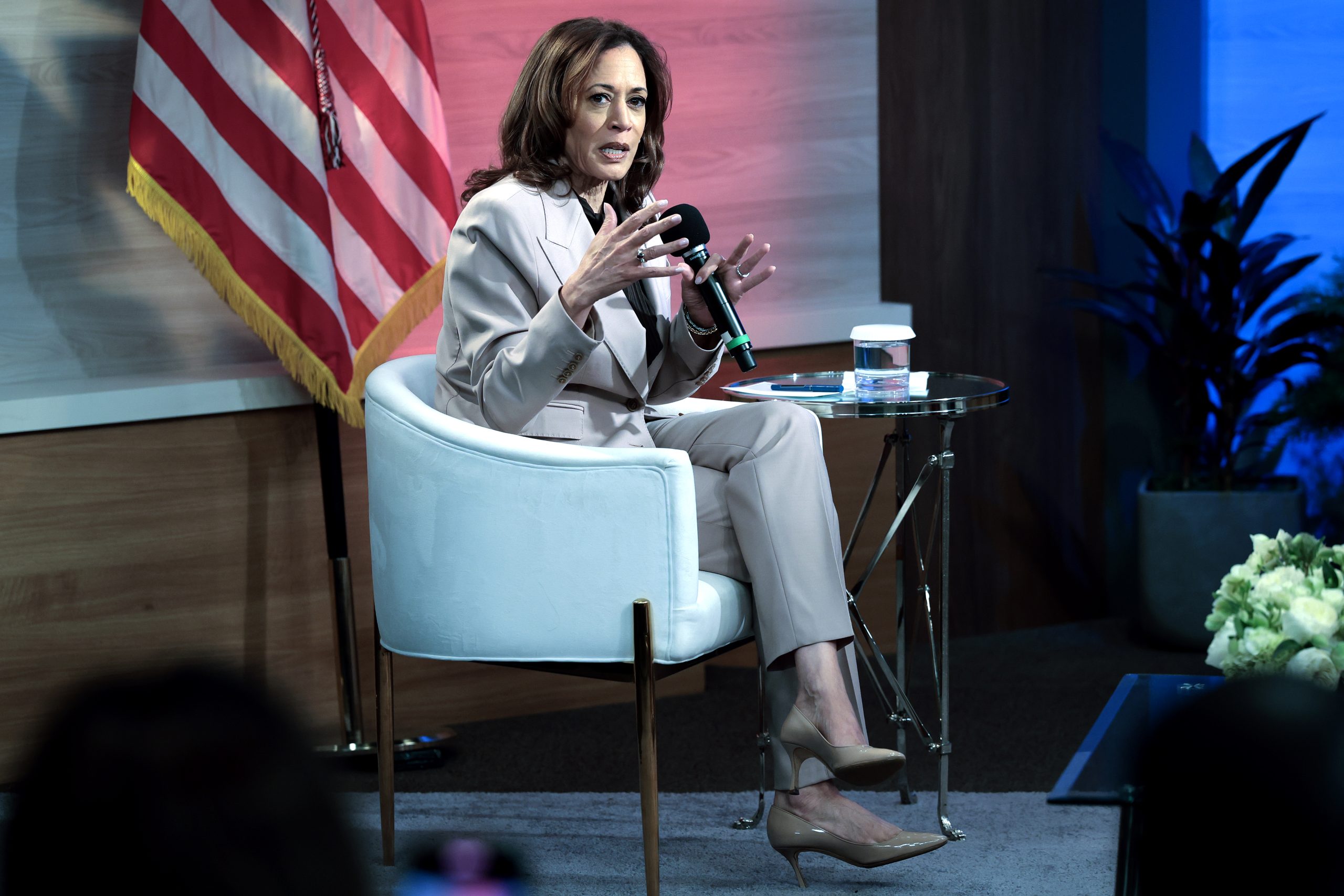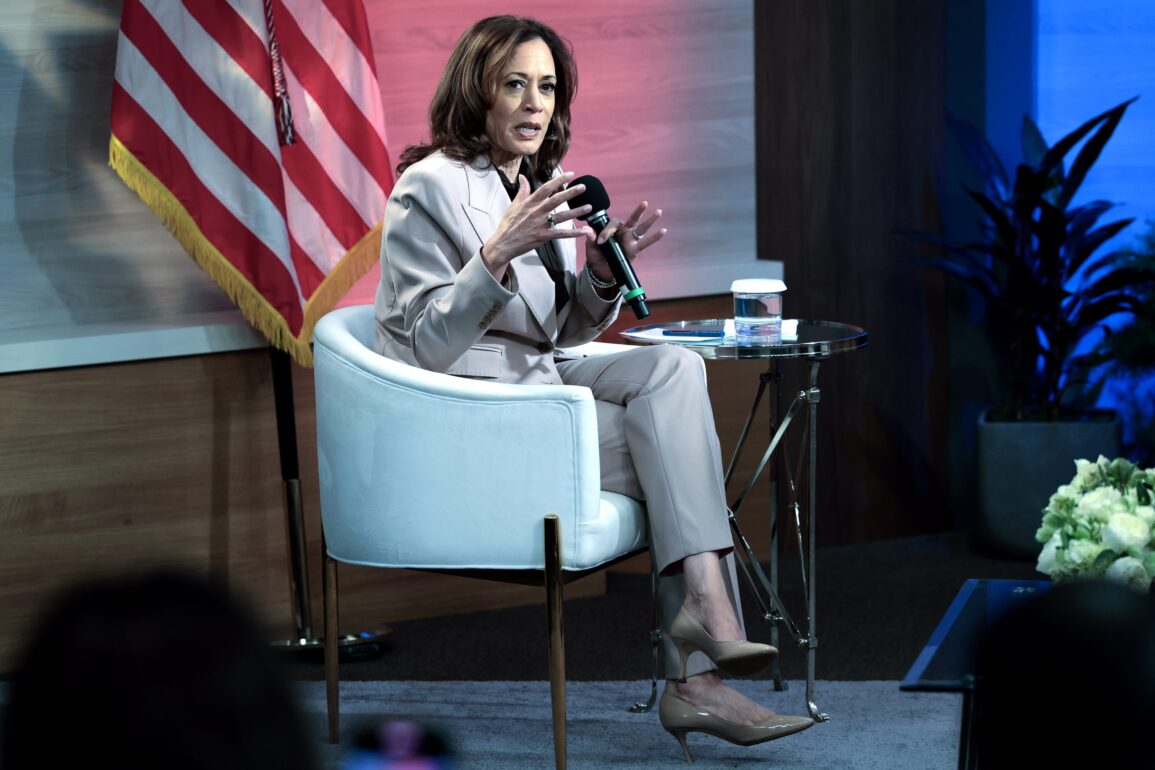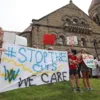
Weeks after the National Association of Black Journalists caught flak for hosting former President Donald Trump at its annual convention in Chicago, a panel of three NABJ members sat down with his rival, Vice President Kamala Harris, in Philadelphia.
Harris’ campaign was in talks with NABJ in July to determine whether a virtual or in-person option would be possible. But the two parties reached an impasse over Harris’ scheduling, which became increasingly busy after President Joe Biden abruptly dropped out of the race and passed the torch to his lieutenant.
Tuesday’s interview — moderated by Gerren Keith Gaynor of theGrio, Tonya Mosley of WHYY, and Eugene Daniels of Politico — was wide-ranging, covering various issues that Black voters have said are their top concerns, from the cost of living to the threat of racist attacks.
For instance, when asked whether Black voters have fared better economically under the current administration, Harris described some of the accomplishments of the past few years.
“We’ve created over 16 million new jobs, including over 800,000 new manufacturing jobs. We have the lowest Black unemployment rate in generations,” the vice president told the panel. “We know Black folks are 60% more likely to be diagnosed with diabetes, and we have now finally capped the cost of insulin for our seniors at $35 a month, and capped the cost of prescription medication for our seniors at $2,000 a year.”
Harris took this opportunity to underscore her economic policy agenda, reiterating her promise to lower the cost of living for struggling Americans by, among other things, reining in the cost of housing and food.
It took only minutes for Black men, as a voting bloc, to come up in the discussion. The panel asked Harris about some polling showing that a growing number of Black men are open to voting for Trump, drawn by his emphasis on the economy.
Read More: Are We Really in the Middle of a ‘Racial Realignment’ in Politics?
Harris responded by recontextualizing the question, saying that neither she nor Trump should operate according to the assumption that Black men are in anybody’s pocket, and that she’s determined to earn their vote.
How?
“I started, way before I was at the top of the ticket, what I called an Economic Opportunity Tour focused on Black men, understanding that, for example, we have so many entrepreneurs in the community who do not have access to capital, but they’ve got great ideas,” Harris said.
She added, “My work has included, as vice president, getting billions more dollars into community banks, including working with big banks to do that so that we can increase access to capital for our small businesses, for our startups.”
One of the most moving moments on Tuesday arrived when the conversation turned to Springfield, Ohio, where Gov. Mike DeWine has deployed the Ohio State Highway Patrol to monitor schools.
Since last week, when Trump and his running mate, U.S. Sen. JD Vance of Ohio, rehashed racist and xenophobic conspiracy theories about Haitian migrants in Springfield, schools there have received more than 30 bomb scares.
Read More: Haitian American Group Demands Retraction of Trump’s Statements
“It’s a crying shame. My heart breaks for this community,” Harris said, painting a vivid image of children whose picture day was interrupted because of a bomb threat. “I learned a long time ago in my career, having a background as a prosecutor, when you have these positions — when you have that kind of microphone in front of you — you really ought to understand, at a very deep level, how much your words have meaning.”
She added, “I learned at a very young stage of my career that the meaning of my words could impact whether somebody was free — or in prison.”
Unsurprisingly, the tone of the event was dramatically different from NABJ’s interview with Trump in July.
During that discussion, Trump questioned Harris’ racial identity, claiming that he didn’t know that she’s Black until some years ago, “when she happened to turn Black, and now she wants to be known as Black.” The former president also disrespected the Black women moderating the panel, frequently complaining about their questions.
This isn’t to suggest that there were no tense moments on Tuesday. When the panel pressed Harris on Gaza — on whether she would pursue a specific policy change that might end a war that’s killed more than 41,000 Palestinians over the past year — she stuck to her usual line.
“We need to get this [ceasefire] deal done, and we need to get it done immediately,” she said. “That is my position. That is my policy.”
Still, as the conversation came to a conclusion, the vice president made sure to lean into the joy that has characterized her bid for the White House.
“I find joy in building community. I find joy in building coalitions,” she said. “I find joy in believing that the true measure of the strength of a leader is not based on who you beat down, but who you lift up. And I think we should all find joy, and have a sense of optimism about who we are as Americans and what we mean to each other and what we can do to lift each other up.”



